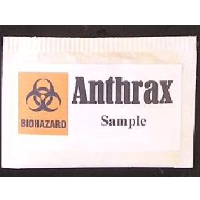Court Denies 1st Amendment Right to Label Sugar Packets as Anthrax
 Relabeled sugar packet (photo: Marc Keyser)
Relabeled sugar packet (photo: Marc Keyser)
Marc Keyser of Sacramento wanted to be “provocative” and get a “reaction” from people when he sent them packets of sugar labeled “Anthrax” and a copy of his self-published book (on CD) about the deadly toxin he was promoting.
He got his wish. Keyser was arrested and accused of mailing threats to more than 100 officials, businesses and news agencies. A jury found him guilty on two counts of sending “threatening communications” and three counts of communicating false or misleading information regarding the presence of a biological weapon. He was sentenced to 51 months in prison for the mailings he sent to Starbucks, McDonalds and ex-Congressman George Radinovich.
Keyser claimed he was just exercising his First Amendment free speech rights, but a three-judge panel for the U.S. Court of Appeals, Ninth Circuit ruled last week that his “intent to threaten” crossed a line.
“Famously, the First Amendment does not protect someone who falsely cries ‘fire’ in a crowded theater,” Judge Richard Clifton wrote, citing a 1919 Supreme Court decision Schenck v. United States. The court also pointed out that “threats generally are not entitled to First Amendment protection.”
The 70-year-old Keyser said he wrote his book, Anthrax: Shock and Awe Terror, as a cautionary tale after the 9/11 attacks. He sent the first publicity package to the Sacramento News & Review in 2007. It contained a letter, a CD of the book and a spray can with a biohazard symbol and an “Anthrax” label.
That initiated a visit, and a warning, from the FBI. Keyser promised not to do it again. The next year he sent out 120 mailings that included the “Anthrax” sugar packets and CDs with former General and Secretary of State Colin Powell’s picture on the cover.
At trial, Keyser’s lawyer argued that the mailing sent to Starbucks and McDonalds wasn’t addressed to a specific person, just “manager,” and therefore his actions couldn’t be considered a threat to anyone. The appeals court didn’t buy that argument either, stating that a manager is a person and, regardless, in this case the law makes no distinction if the threatened entity is not a person. The court also did not think having the word “Sample” on the “Anthrax” label mitigated the threat.
Although the conviction was upheld, the appeals court said the trial judge improperly applied enhanced sentencing guidelines based on additional charges he wasn’t found guilty of. They sent the case back to the lower court for resentencing.
–Ken Broder
To Learn More:
Free Speech Rights Don't Extend to Publicity Stunt (by Tim Hull, Courthouse News Service)
Mailing Fake Anthrax Is Not Protected Speech, Court Says (by David Kravetts, Wired)
United States of America v. Marc McMain Keyser (U.S. Court of Appeals for the Ninth Circuit) (pdf)
- Top Stories
- Controversies
- Where is the Money Going?
- California and the Nation
- Appointments and Resignations
- Unusual News
- Latest News
- California Forbids U.S. Immigration Agents from Pretending to be Police
- California Lawmakers Urged to Strip “Self-Dealing” Tax Board of Its Duties
- Big Oil’s Grip on California
- Santa Cruz Police See Homeland Security Betrayal in Use of Gang Roundup as Cover for Immigration Raid
- Oil Companies Face Deadline to Stop Polluting California Groundwater





